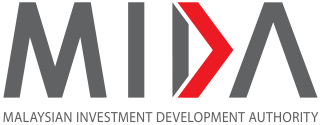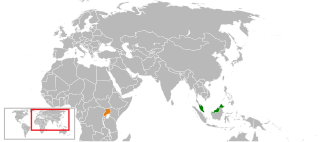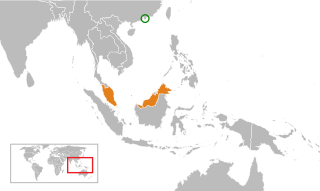Related Research Articles

Though the Ministry of Foreign Affairs (MOFA) is the government agency which is responsible for conducting the foreign relations of Nepal, historically, it is the Office of the Prime Minister (PMO) which has exercised the authority to formulate the country's foreign policies. As a landlocked country wedged between two larger and far stronger powers, Nepal has tried to maintain good relations with both of its neighbors, People's Republic of China and Republic of India. However, the relationship between Nepal and India was significantly hampered by the 2015 Nepal blockade when the Government of Nepal accused India of mimicking "Russia-Ukraine" tactics by using ethnically Indian residents of Nepal to cause unrest along Nepal's southern border. India denied the allegation and said the unrest were an internal affair. For the most part though, Nepal has traditionally maintained a non-aligned policy and enjoys friendly relations with its neighboring countries and almost all the major countries of the world.

Bursa Malaysia is the stock exchange in Malaysia. It is one of the largest bourses in ASEAN. It is based in Kuala Lumpur and was previously known as the Kuala Lumpur Stock Exchange (KLSE). It provides full integration of transactions, offering a wide range of currency exchange and related services, including trading, settlement, clearing and savings services.
Net asset value (NAV) is the value of an entity's assets minus the value of its liabilities, often in relation to open-end, mutual funds, hedge funds, and venture capital funds. Shares of such funds registered with the U.S. Securities and Exchange Commission are usually bought and redeemed at their net asset value. It is also a key figure with regard to hedge funds and venture capital funds when calculating the value of the underlying investments in these funds by investors. This may also be the same as the book value or the equity value of a business. Net asset value may represent the value of the total equity, or it may be divided by the number of shares outstanding held by investors, thereby representing the net asset value per share.
A high-yield investment program (HYIP) is a type of Ponzi scheme, an investment scam that promises unsustainably high return on investment by paying previous investors with the money invested by new investors.

The Malaysian Investment Development Authority, abbreviated MIDA, previously known as Malaysian Industrial Development Authority is the government's principal agency to oversee and drive investment into the manufacturing and services sectors in Malaysia. Starting operations in 1967, MIDA was given the mandate to promote investments in the manufacturing and services sectors; and to advise the Ministry of International Trade and Industry (MITI) on industry matters including the formulation of related policies.

The Securities Commission Malaysia is a Malaysian statutory body with responsibility for the development and regulation of capital markets in the country. It is located in Bukit Kiara, near the National Science Centre of Kuala Lumpur.
John Peter Galanis is an American financier in the 1970s and 1980s, who became a notorious white-collar criminal. Galanis has four sons and, at the age of 76, is currently incarcerated at Federal Correctional Institution, Terminal Island in San Pedro, California, after being convicted in 2019 for defrauding a Native American tribal entity and various investment advisory clients of tens of millions of dollars in a fraudulent and deceptive bond scam.

AmBank Group comprises AMMB Holdings Berhad is one of the largest banking groups in Malaysia whose core businesses are retail banking, wholesale banking, Islamic banking, and life and general insurance.

Bilateral ties between Malaysia and the United States were established upon Malayan independence in 1957. The US was, and still is one of the largest trading partners for Malaysia and is traditionally considered to be Malaysia's oldest and closest ally in military, economic and education sectors. Malaya was the predecessor state to Malaysia, a larger federation formed through the merger of Malaya, North Borneo, Sarawak and Singapore in 1963. Immediately before the merger, the latter three territories were previously part of the British Empire. But the US has had consular and commercial presence in Malaya since the 1800s. US merchants, especially Joseph William Torrey together with Thomas Bradley Harris also had commercial interests in north western coast of Borneo in the 19th century as well, where they established the American Trading Company of Borneo.

Malaysia–Sweden relations refers to foreign relations between Malaysia and Sweden. Sweden has an embassy in Kuala Lumpur, and Malaysia has an embassy in Stockholm. As of 2009, 90 Swedish companies are present in Malaysia and about 450 Swedish citizens live in Malaysia. The number of Swedish citizens visiting Malaysia in 2011 was 44,138.

India–Malaysia relations, also called the Indo-Malaysian relations, are the bilateral foreign relations between India and Malaysia. India has a high commission in Kuala Lumpur, and Malaysia has a high commission in New Delhi and a consulate general in Chennai and Mumbai. Both countries are full members of the Commonwealth of Nations, Asia Cooperation Dialogue and G15. India and Malaysia are also connected by various cultural and historical ties that date back to antiquity. The two countries are on excellently friendly terms with each other seeing as Malaysia is home to a strong concentration of Indian immigrants. Mahathir Mohamad, the fourth and longest serving Prime Minister of Malaysia has Indian ancestry. On trade front their bilateral trade volume stands at $10.5 billion and is poised to reach $25 billion by 2020.

Malaysia–Oman relations refers to the bilateral relationship between Malaysia and Oman. Malaysia has an embassy in Muscat, and Oman has an embassy in Kuala Lumpur.

Malaysia–Turkmenistan relations refers to foreign relations between Malaysia and Turkmenistan. Malaysia has an embassy in Ashgabat, and Turkmenistan has an embassy in Kuala Lumpur.

Kyrgyzstan–Malaysia relations refers to foreign relations between Kyrgyzstan and Malaysia. Kyrgyzstan has an embassy in Kuala Lumpur, while Malaysia embassy in Tashkent, Uzbekistan is also accredited to Kyrgyzstan.

Malaysia–Uganda relations refers to bilateral foreign relations between Malaysia and Uganda. Malaysia does not have a High Commission in Uganda while Uganda has a High Commission in Kuala Lumpur and were also accredited to Brunei, Indonesia, Philippines, Thailand, Vietnam, Laos, Cambodia and Myanmar.

Algeria has an embassy in Kuala Lumpur, and Malaysia has an embassy in Algiers.

Malaysia–Morocco relations refers to bilateral foreign relations between Malaysia and Morocco. Malaysia has an embassy in Rabat, and Morocco has an embassy in Kuala Lumpur. Both countries are members of the Organisation of Islamic Cooperation.

Hong Kong–Malaysia relations refers to bilateral diplomatic relations between Hong Kong and Malaysia.
References
- 1 2 "Swisscash Internet Investment Scam: Frequently Asked Questions | Securities Commission Malaysia". www.sc.com.my. Retrieved 2018-06-18.
- ↑ "Welcome to SWISS MUTUAL FUND". Jun 14, 2007. Archived from the original on 2007-06-14. Retrieved Feb 7, 2019.
- ↑ "Welcome to SWISS MUTUAL FUND". Jan 17, 2006. Archived from the original on 2006-01-17. Retrieved Feb 7, 2019.
- ↑ "Embassy of Switzerland - Kuala Lumpur". May 18, 2006. Archived from the original on 2006-05-18. Retrieved Feb 7, 2019.
- ↑ "Error". www.eda.admin.ch.
- ↑ "Request Rejected" (PDF). www.gov.im.
- ↑ "Public Notice issued by Commonwealth of Dominica – Swiss Mutual Fund (1948) S.A. - Isle of Man Public Services -". www.gov.im. Retrieved 2018-06-18.
- ↑ "Public Notice issued by Commonwealth of Dominica – SwissCash - Isle of Man Public Services -". www.gov.im. Retrieved 2018-06-18.
- ↑ "Request Rejected" (PDF). www.gov.im.
- ↑ "Swisscash: Landmark judgement for the SC- Monies overseas to be traced and repatriatedSecurities Commission Malaysia | Securities Commission Malaysia". www.sc.com.my. Retrieved 2018-06-18.
- ↑ "Swisscash Investment Scam Settlement: FAQSSecurities Commission Malaysia | Securities Commission Malaysia". www.sc.com.my. Retrieved 2018-06-18.
- ↑ "SC obtains RM31 million for investors in Swisscash settlementSecurities Commission Malaysia | Securities Commission Malaysia". www.sc.com.my. Retrieved 2018-06-18.
- ↑ "Swisscash Investor Restitution UpdateSecurities Commission Malaysia | Securities Commission Malaysia". www.sc.com.my. Retrieved 2018-06-18.
- ↑ "TODAYonline". Archived from the original on 2007-01-29. Retrieved 2007-01-29.
- ↑ "| Bank Negara Malaysia | Central Bank of Malaysia". www.bnm.gov.my. Retrieved Feb 7, 2019.
- ↑ "404". www.moneysense.gov.sg. Retrieved Feb 7, 2019.
{{cite web}}: Cite uses generic title (help)